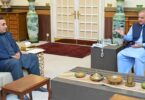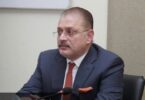F.P. Report
ISLAMABAD: The Election Commission of Pakistan (ECP) on Thursday informed the Supreme Court that general elections in the country will be held on February 11, 2024, ending months-long uncertainty that whether the polls will take place or not.
ECP’s lawyer Sajeel Swati further told the apex court, which was hearing a set of petitions calling for holding of elections with 90 days after the dissolution of national and provincial assemblies, that the delimitation process would be completed by November 30 and elections will be held 54 days after that.
A three-judge bench headed by Chief Justice of Pakistan (CJP) Qazi Faez Isa, Justice Amin-ud-Din Khan and Justice Athar Minallah was in session hearing pleas filed by Supreme Court Bar Association (SCBA), the PTI, Munir Ahmad and Ibad-ur-Rehman.
During today’s proceedings, the CJP sought a clear stance from the electoral body on polls to which the ECP lawyer said there was a 54-day schedule after the delimitation process is over on November 30. “All arrangements including the drawing of constituencies will be completed by January 29,” Swati said, adding the final list of constituencies will be published on December 5.
Swati said the electoral body had been looking to hold polls on a Sunday for the ease of the public. “Hence we decided that elections will be held on February 11, which is the second Sunday of the month,” he added.
Subsequently, CJP Qazi Isa asked the ECP lawyer if President Arif Alvi was taken on board on the poll date issue. In response, Swati said “We are not bound to consult the president.”
The ECP counsel’s response triggered an angry reaction from CJP Isa, who asked “Both the president and ECP are Pakistanis. Why is the ECP hesitant to consult with the president?”
The chief justice then ordered the electoral body to discuss the matter with President and that too today and report back to the court.
The CJP remarked that apex court will ensure elections on the given date. “Once the process is final, then no one can change it,” he added.
Later, Swati told the court that the ECP would consult the president today. “Knock his door even if he doesn’t call you,” Justice Isa said and then instructed Attorney General for Pakistan (AGP) Mansoor Usman Awan to stay on board during the consultation.
The CJP further remarked the court wanted to settle this issue once for all. “The court will make the consultation with the president as part court’s record,” he said.
Earlier, Chief Justice of Pakistan Justice Qazi Faez Isa has hinted at wrapping up the hearing of a set of petitions seeking holding of elections in the country within 90 days after the dissolution of the national and provincial assemblies.
During the last hearing, CJP Isa observed that it was “not possible” to meet the 90-day deadline for holding elections. The CJP in his written order stated that the petitioners were contending that the census was notified as an excuse to delay the elections.
“The petitioners said that holding the election in 90 days is a constitutional requirement. According to the petitioners, elections are not possible within 90 days after the delimitation of constituencies and the census,” said the court.
At the outset of the hearing on Thursday, Pakistan Peoples Party (PPP) lawyer Farooq Naek informed the apex court that his party had submitted the request to become a party in the case.
After this, PTI’s lawyer Barrister Ali Zafar launched his arguments by saying that the party has limited its petition to only seeking timely elections. “Elections must be held within 90 days after the dissolution of assemblies as per the Constitution,” he stressed.
At this, CJP Isa said that the plea seeking polls within a 90-day period has then become ineffective. “The court was told that it was impossible to hold polls within 90 days in the previous hearing,” he remarked.
Ali Zafar then said that PTI only wants elections, adding there won’t be any parliament and law if elections are not conducted.
“Giving a date and schedule of elections are two different things. President Dr Arif Alvi had written a letter to hold consultations with the ECP,” he remarked.
The CJP observed that the president had written in his letter that the court should look into the matter of elections. “Is the president saying that court should take notice of the issue pertaining to elections?” he questioned.
Ali Zafar replied that the president had said that the court can also review the matter.
CJP Isa then said that the president did not give any date for elections in his letter. “Did the president not fulfil his constitutional duty?” he asked.
Ali Zafar said that the president fulfilled his responsibility by consulting on the elections.
On this point, Justice Athar Minallah asked why the president wrote the letter in September and not on August 15 after the assemblies were dissolved on August 9.
“Did the president only ask the Supreme Court verbally to take notice of the matter?” asked the CJP, saying the head of state wrote the letter to the ECP and not to the Supreme Court.
CJP Isa then questioned whether the apex court had the authority to give a date for polls. “Is it necessary for the president to consult the prime minister to give a date?” he inquired.
Ali Zafar replied that consultations are not necessary as the president has his own constitutional duty to give a date.
Meanwhile, Justice Minallah said, “The command of the Constitution is very clear that the president had to give the date [for elections], there is no disagreement in it.”
Courtesy: (24News)







